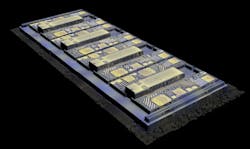It's easy to argue the reason interest is exploding in AI this year is because of ChatGPT. The application is a “chatbot” with deep-learning abilities and can generate summaries for search queries presented in easy-to-read paragraph form, instead of returning pages of websites as a search engine would. It can also read spreadsheets and reply to questions related to these uploads, or analyze images, and much more. For many professions, its impact is already being felt.
Powered by fiber-optic communications
Programs such as ChatGPT and Google’s Bard rely on fiber-optic communications. Fiber-optic cables deliver data between servers located far apart from each other, so these cables transmit light signals in the form of photons. The light signals are then converted into electrical signals that can be processed by AI algorithms powering software applications.
Fiber-optic communications offers several advantages over traditional copper wire connections, including faster data transmission speeds and better resistance to interference from electromagnetic radiation. This feature is particularly important for AI programs, which require massive amounts of data to be transmitted and processed quickly.
Using light for data transmission through the cables is faster and consumes less power than other materials and, importantly, light generates less heat—by a factor of 10X—than electrons that go through copper wires. Most of the power of modern computing systems is wasted simply by moving data around.
Innovative hardware can solve this problem. Photonics lasers support the growth of AI applications because the light pulses that transmit data are encoded with information, which is then decoded at the receiving end using photo detectors. This feature enables high-speed transmission over long distances, making it ideal for applications like AI and large-scale data center architectures.
Beyond fiber-optic communications and lasers, photonics is also used in the development of specialized chips—including AI accelerator chips—and sensors that power AI programs. These components process and analyze data from various sources, including images, videos, and speech, which then helps the AI applications become smarter and more predictive.
Global photonics market is growing
The global photonics market is expected to rise from $722 billion to $1.2 trillion by 2028, according to SkyQuest, a market intelligence firm. The chip market alone is projected by Allied Market, a market research firm, to surpass $263 billion by 2031.
Among the companies poised to be a significant player in this growth is POET Technologies. The company has architected light source and light engine solutions to lower the cost for AI developers and is currently supplying the market with our initial products within this sector.
POET makes an optical engine with high-power continuous-wave (CW) lasers passively attached to its optical interposer (see figure). The optical engine can be integrated on a host board and connected to chips and ASICs with built-in silicon photonics. POET also developed a complete packaged light source that incorporates passive optical components and is connected on the electrical and optical ends.
These light source solutions manage the data flow among microchips within an AI system. It makes data transmission faster and less power-hungry. There are also advantages of cost and scale.
4 keys to help customers
- POET’s Starlight complete packaged light source integrates active components like lasers into its optical interposer with wafer-scale passive alignment techniques.
- It can be integrated on a host board and connected to chips and application-specific integrated circuits (ASICs) with built-in silicon photonics.
- High-power CW lasers, monitor photodiodes, and thermistors are integrated into our optical interposer with standard pick-and-place methods.
- Optical splitters, combiners, multiplexers, and demultiplexers are monolithically built into the interposer platform for a multiwavelength multichannel light output that powers several channels with the same source. This capability supports continuous-wave wavelength division multiplexing multisource agreement (CW-WDM MSA) wavelengths and power requirements.
By using best-of-breed or known-good components, including directly modulated lasers (DMLs) from suppliers like Lumentum, POET has demonstrated excellent side mode suppression ratio (SMSR) and power uniformity, which are essential to creating efficiency.
Underscoring importance of hardware devices
Recent research articles underscore the importance of hardware devices such as those developed from our optical interposer. Hardware is increasingly recognized as being critical to the long-term growth of the AI industry.
A July report by Semianalysis discusses how large chipmakers are using some form of silicon photonics to attempt to meet the demand for more memory and compute data. Notably, the article cites the use of through-silicon vias (TSVs) and flip-chip bonders as being key elements to deliver the required signal integrity and efficiency needed for AI.
These key features are already part of POET’s optical interposer. Meanwhile, an article in the Financial Times on July 21, 2023 points out how the explosion in AI startups this year has both disrupted the industry and complemented its growth. The development of hardware solutions that use optical technology are smartly being designed to satisfy the needs of behemoths like Nvidia, which achieved trillion-dollar market-capitalization status in May and is continuing to see high demand for its AI chips.
Overall, photonics’ ability to transmit data quickly and accurately over long distances, as well as process and analyze data from various sources, makes it indispensable for the development of advanced AI systems. Being at the leading edge of this rapidly evolving industry is tremendously exciting for the team at POET. As one of the few AI hardware companies in the world, we believe we are in the right place at the right time with the right solution for this sector.
Suresh Venkatesan | CEO, POET Technologies
Dr. Suresh Venkatesan is CEO of POET Technologies (San Jose, CA).
